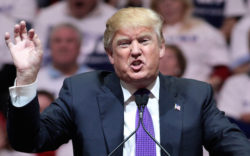What if China, flush with its new wealth, opened its doors to mass immigration? It would make sense from an economic and social point of view, because its one-child-per-family policy has produced a young generation far smaller than the one that now does most of the work. China’s population is “aging†(i.e., its average age is going up) faster than any other country in history, and it could certainly do with some more young people.
If it had an immigration policy like that of the United States, China could fill all the gaping holes in the workforce that will open up when the present adult generation retires, and there would be enough people working and paying taxes to support that older generation in its “golden years.†Otherwise, there will be barely one worker for each retiree, and their post-retirement years will be far from golden.

So, let’s suppose China opens the gates. (Stay with me on this.) The immigrants would come—from all over the world. Probably most would be from south and southeast Asia (India, Pakistan, Burma, Indonesia, the Philippines), but plenty of Russians would come, too. So would Arabs from the slums of Cairo, and Congolese from the slums of Kinshasa, and Mexicans fleeing the bloody war on drugs.
There would be young Europeans coming, too, fleeing the 25-to-50 percent youth unemployment rates of Spain, Italy and Greece. Some Americans would also come, like former automobile workers from Rust-Belt states, hoping that their skills would find employment in what is now the world’s biggest car-maker. China’s politics wouldn’t deter them; they have already tried being free and poor, and some of them would be willing to trade.
They would all come, and China would be transformed. In 50 or 60 years it would be one of the world’s most diverse societies. Almost all the new immigrants would learn to speak some Chinese, of course, but their children would be fluent in the language. Indeed, they would think of themselves as Chinese, even though their skins were white, brown or black and their religions Muslim, Christian, Buddhist or Hindu.
Some tens of millions of them would already have intermarried with ethnic Chinese, if only because there are tens of millions of young Chinese men who will otherwise remain unmarried. (The Chinese have been killing too many of their baby girls.) And everybody would live more or less happily ever after.
I know. It’s never going to happen, because the Chinese would never let it happen. But that’s precisely the point. The Americans have let it happen. Why?
I’m not saying it is a bad thing. Personally, I like it. But it is an extraordinary thing. Sixty years ago the United States was a country whose population was overwhelmingly of white European descent. The only really big minority was the black and mixed-race descendants of African slaves, who accounted for about one-eighth of the population. And then the United States opened the gates very wide.
Last month, the U.S. Census Bureau revealed that non-white births in the country narrowly exceeded the number of births to white Americans for the first time. There are some curious kinks in the statistics, such as the fact that Spanish-speaking whites are not counted as white, but the message is clear: the next adult generation in the United States will not be majority white.
So, why did the last two generations of Americans, who were still mostly of European descent, let it happen? Did they welcome and encourage it as a good thing for the country’s future? Or were they just asleep at the wheel?
Some Americans certainly did encourage it, arguing that turning the United States into a microcosm of the whole world was fulfilling its destiny, and that the sheer diversity of its future population would give it a huge competitive advantage in the world. But there were not many people who made that argument, and there is actually little evidence to show that ethnic diversity makes a country more competitive.
Nor did this immense change happen while the old white population was just not paying attention. There were debates about immigration policy all the time, there was plenty of information about where the current immigration policy was leading, and Americans simply let it happen.
One explanation that sounds plausible is that it was about fairness. As descendants of immigrants themselves, they felt that they could not deny others the same opportunities. Many older white Americans were clearly uneasy about the new social reality that was springing up around them, but most of them remained true to their ideals and never mobilised to stop it.
Maybe the last two generations of Americans were a lot less racist than many people—including many Americans—thought. Or perhaps they were all silently aware that only 500 years ago, none of the births in North America were white.
Gwynne Dyer is a London-based independent journalist whose articles are published in 45 countries.
Like what you just read? Support Flagpole by making a donation today. Every dollar you give helps fund our ongoing mission to provide Athens with quality, independent journalism.









